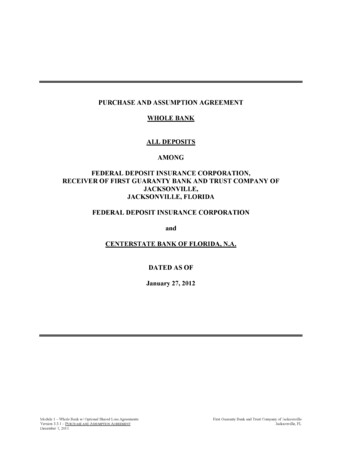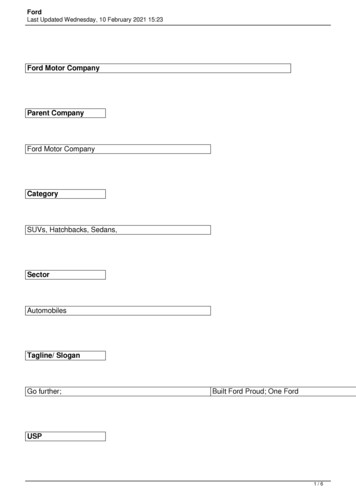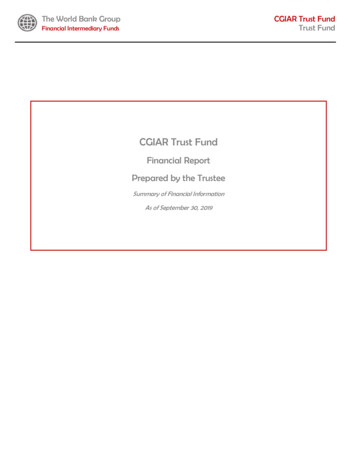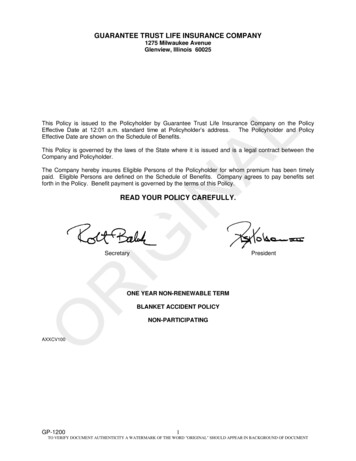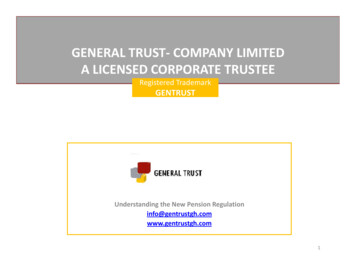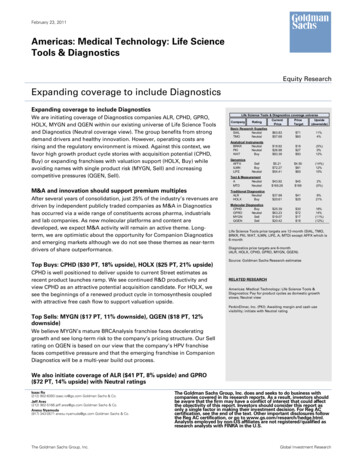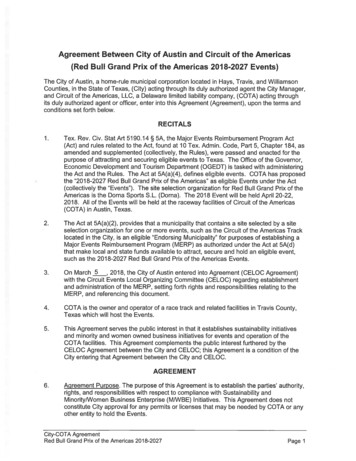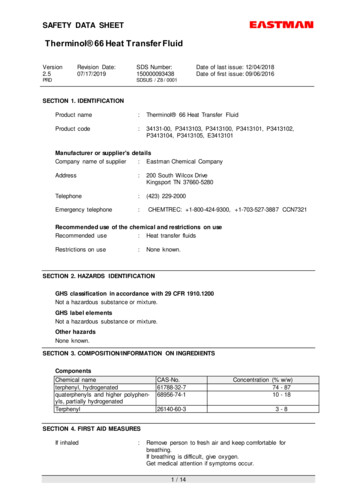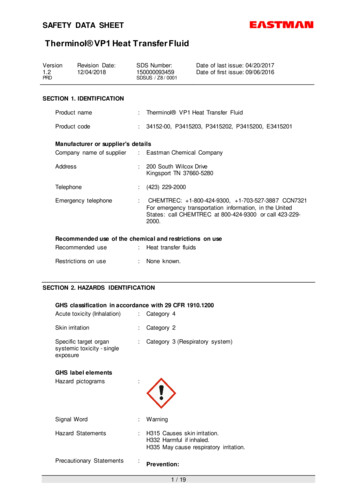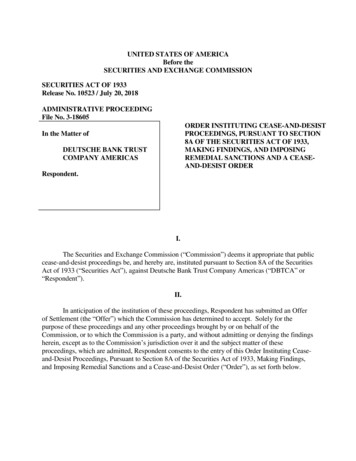
Transcription
UNITED STATES OF AMERICABefore theSECURITIES AND EXCHANGE COMMISSIONSECURITIES ACT OF 1933Release No. 10523 / July 20, 2018ADMINISTRATIVE PROCEEDINGFile No. 3-18605ORDER INSTITUTING CEASE-AND-DESISTPROCEEDINGS, PURSUANT TO SECTION8A OF THE SECURITIES ACT OF 1933,MAKING FINDINGS, AND IMPOSINGREMEDIAL SANCTIONS AND A CEASEAND-DESIST ORDERIn the Matter ofDEUTSCHE BANK TRUSTCOMPANY AMERICASRespondent.I.The Securities and Exchange Commission (“Commission”) deems it appropriate that publiccease-and-desist proceedings be, and hereby are, instituted pursuant to Section 8A of the SecuritiesAct of 1933 (“Securities Act”), against Deutsche Bank Trust Company Americas (“DBTCA” or“Respondent”).II.In anticipation of the institution of these proceedings, Respondent has submitted an Offerof Settlement (the “Offer”) which the Commission has determined to accept. Solely for thepurpose of these proceedings and any other proceedings brought by or on behalf of theCommission, or to which the Commission is a party, and without admitting or denying the findingsherein, except as to the Commission’s jurisdiction over it and the subject matter of theseproceedings, which are admitted, Respondent consents to the entry of this Order Instituting Ceaseand-Desist Proceedings, Pursuant to Section 8A of the Securities Act of 1933, Making Findings,and Imposing Remedial Sanctions and a Cease-and-Desist Order (“Order”), as set forth below.
III.On the basis of this Order and Respondent’s Offer, the Commission finds1 that:Summary1.These proceedings arise out of DBTCA’s improper practices involving the prerelease of American Depositary Receipts (“ADRs”).22.ADR facilities, which provide for the issuance of ADRs, are established by adepositary bank (the “Depositary”), such as DBTCA, pursuant to a deposit agreement (“DepositAgreement”).3.As part of its role, a Depositary issues ADRs to a market participant thatcontemporaneously delivers the corresponding number of foreign ordinary shares to theDepositary’s foreign custodian (“Custodian”). However, in certain situations, DepositAgreements may provide for “pre-release” transactions in which a market participant can obtainnewly issued ADRs from the Depositary before delivering ordinary shares to the Custodian.3Only brokers (or other market participants) that have entered into pre-release agreements with aDepositary (“Pre-Release Agreements”) can obtain pre-released ADRs from the Depositary. ThePre-Release Agreements, consistent with the Deposit Agreements, require the broker receivingthe pre-released ADRs (“Pre-Release Broker”), or its customer on whose behalf the Pre-ReleaseBroker is acting, to beneficially own the ordinary shares represented by the ADRs, and to assignall beneficial right, title, and interest in those ordinary shares to the Depositary while the prerelease transaction is outstanding. In effect, the broker or its customer becomes the temporarycustodian of the ordinary shares that would otherwise have been delivered to the Custodian.4.Contrary to how pre-release transactions were supposed to work, DBTCA at timespre-released ADRs to Pre-Release Brokers in circumstances where DBTCA was negligent withrespect to whether the Pre-Release Brokers, or the parties on whose behalf the pre-releasedADRs were being obtained, actually beneficially owned the corresponding number of ordinaryshares, as they represented to DBTCA in their Pre-Release Agreements. The result of this1The findings herein are made pursuant to Respondent’s Offer of Settlement and are notbinding on any other person or entity in this or any other proceeding.2ADRs allow U.S. investors to invest in foreign companies without having to purchase theshares in the foreign markets, and allow foreign companies to get increased exposure to U.S.markets.3The securities deposited typically are equity securities, but debt securities may alsounderlie ADRs.2
conduct was the issuance of ADRs that in many instances were not backed by ordinary shares asrequired by the ADR facility.4 This conduct violated Section 17(a)(3) of the Securities Act.5Respondent5.DBTCA is a financial services firm that, among other things, serves as a Depositarythat issues and cancels depositary receipts. DBTCA is a wholly-owned subsidiary of DeutscheBank Trust Corporation, a New York corporation, which in turn is an indirect wholly-ownedsubsidiary of Deutsche Bank Aktiengesellschaft. DBTCA has its principal office and place ofbusiness in New York, New York.BackgroundADRs and the Pre-Release of ADRs6.ADRs are negotiable instruments that represent an ownership interest in aspecified number of foreign securities that have been deposited with a Depositary. ADRs maybe traded on U.S. stock exchanges or over-the-counter. The owner of an ADR has the right toobtain the underlying foreign securities by withdrawing them from the ADR facility.67.An ADR is either “sponsored” or “unsponsored.” If the ADR is sponsored, theDeposit Agreement is among the foreign issuer whose securities are represented by the ADRs(i.e., the sponsor), the Depositary, and ADR holders. If the ADR is unsponsored, the DepositAgreement is between a Depositary and the ADR holders.7 In either case, the DepositAgreement describes fees applicable to the ADRs and the party responsible for paying thosefees. In addition, the Depositary files a Securities Act registration statement on Form F-6 with4See settled orders in Matter of ITG Inc., Securities Act Rel. No. 10279 (Jan. 12, 2017);Matter of Banca IMI Securities Corp., Securities Act Rel. No. 10401 (Aug. 18, 2017).5A violation of Section 17(a)(3) (prohibiting engaging in any course of business thatoperates or would operate as a fraud or deceit upon the purchaser in the offer or sale ofsecurities) may rest on a finding of simple negligence; scienter is not required. SEC v. HughesCapital Corp., 124 F.3d 449, 453-54 (3d Cir. 1997).6In a more technical sense, ADRs evidence American Depositary Shares, or ADSs, whichrepresent the specific number of underlying ordinary shares of the same company on depositwith the Custodian in the foreign issuer’s home market. In addition, an ADR for a particularcompany may actually represent one ordinary share, more than one ordinary share, or a fractionof an ordinary share. The ADR-to-ordinary share ratio varies by ADR facility, based on pricingin the foreign and U.S. markets.7An unsponsored ADR is created by the Depositary and does not involve the formalparticipation (or require the agreement) of the foreign company whose securities the ADRsrepresent.3
the Commission to register the offer and sale of the ADRs, which includes the DepositAgreement and the form ADR as exhibits.8.Form F-6 may be used to register the offer and sale of ADRs if certain conditionsare met, including that the ADR holder must be entitled to withdraw the deposited securities atany time, subject to certain limited exceptions inapplicable here. Typically, when ADRs areissued, a specified number of ordinary shares represented by the ADRs are contemporaneouslydelivered to the Custodian. In this way, those underlying ordinary shares are in effect removedfrom the market and the total number of securities in the markets — ADRs plus ordinary shares— is unaffected. This ensures that all ADR holders have the option to withdraw the ordinaryshares underlying their ADRs.9.In some situations, a person may seek to obtain ADRs through a “pre-release”transaction pursuant to a Pre-Release Agreement with a Depositary, as provided for in theDeposit Agreements and in the ADR itself. In a pre-release transaction, a market participantobtains newly issued ADRs from the Depositary (as opposed to purchasing existing ADRs on themarket) without simultaneously delivering the corresponding ordinary shares to the Custodian.10.The traditional rationale for pre-release transactions, which was memorialized inDBTCA’s policies, was to address settlement timing disparities that could delay delivery to theCustodian of recently purchased ordinary shares. In theory, the pre-release transaction would beclosed within a few days after the purchased ordinary shares were received by the Pre-ReleaseBroker. Once issued, pre-released ADRs are indistinguishable from other ADRs of the sameissuer and can be freely traded, even while the pre-release transaction remains open.11.Deposit Agreements, the ADR itself, and Pre-Release Agreements govern theterms of pre-release transactions. Pre-Release Brokers may obtain pre-released ADRs directlyfrom Depositaries with which they have entered into Pre-Release Agreements.12.Deposit Agreements, the ADR itself, and Pre-Release Agreements typicallyrequire a representation that at the time of each pre-release and for the duration such pre-releaseremains outstanding, the Pre-Release Broker or its customer (i) beneficially owns correspondingordinary shares, (ii) assigns all beneficial right, title, and interest in the shares to the Depositary,and (iii) will not take any action with respect to such shares that is inconsistent with the transferof beneficial ownership (collectively, the “Pre-Release Obligations”). In effect, the Pre-ReleaseBroker or its customer must maintain the ordinary shares for the benefit of ADR holders, similarto how the Depositary, through its Custodian, maintains the ordinary shares when it issues ADRsthat are not pre-released.13.Deposit Agreements, the ADR itself, and Pre-Release Agreements also includeprovisions addressing the situation where ADRs have been pre-released over a dividend recorddate. The provisions typically require the Pre-Release Broker or its customer to ensure thatforeign withholding taxes, to the extent due in connection with the dividend on thecorresponding ordinary shares, are paid to the foreign jurisdiction at the rate required for ADRholders, to forward to the Depositary all dividends received on the ordinary shares, net of any4
foreign withholding tax paid, and to pass through any tax credits or refunds from the dividends tothe Depositary. In this way, the rights and obligations of all ADR holders (including those whohold pre-released ADRs) will be protected, and the flow of dividend and tax payments will notbe altered by the fact that the ordinary shares were not simultaneously deposited with theCustodian when the pre-released ADRs were issued.14.Significantly, these agreements are intended to ensure that, at all times until thepre-release position is closed by delivery of ordinary shares to the Custodian (or delivery of anequivalent number of ADRs to the Depositary), the Depositary and the Pre-Release Broker or itscustomer are collectively maintaining, for the benefit of ADR holders, the required number ofordinary shares to correspond to the number of outstanding ADRs. This ensures that the totalnumber of ordinary shares plus shares represented by ADRs available in the markets isunaffected by the fact that some ADRs were pre-released, and that any economic or tax impactrelated to holding the ordinary shares flows to the Depositary and the ADR holders for whosebenefit the Depositary custodies ordinary shares.DBTCA’s Pre-Release Practices15.From at least June 2011 through September 2016, DBTCA was a Depositary thatpre-released ADRs to Pre-Release Brokers in thousands of transactions.16.At least several of the largest (by share volume) Pre-Release Brokers thatroutinely obtained pre-released ADRs from DBTCA during that period failed in many instancesto take reasonable steps to ensure that they or their counterparties complied with the Pre-ReleaseObligations. Indeed, those Pre-Release Brokers falsely certified to DBTCA that they werecomplying with the Pre-Release Agreements. Instead, these Pre-Release Brokers loaned theADRs they received in the pre-release transactions to other parties pursuant to loan agreementsthat did not require compliance with the Pre-Release Obligations. As a result of thesetransactions, many of the ADRs that DBTCA provided to the Pre-Release Brokers were notactually backed by ordinary shares held for the benefit of DBTCA in accordance with the terms ofthe Deposit and Pre-Release Agreements.17.The Depositary Receipts Group (“DR Group”) of DBTCA handled the issuance(including pre-release) and cancellation of ADRs for the Depositary. Personnel in the DR Groupdid not act reasonably in pre-releasing ADRs in light of what such personnel knew about thecircumstances of such transactions, which indicated that Pre-Release Brokers and theircounterparties may not have been complying with the Pre-Release Obligations set forth in theDeposit and Pre-Release Agreements.18.For example, certain personnel in the DR Group knew that Pre-Release Brokersroutinely loaned pre-released ADRs they received to counterparties of the Pre-Release Brokers,including securities lending desks at other larger broker-dealers. The Pre-Release Brokersprofited from the transactions by lending the ADRs to their counterparties at higher rates thanthose at which they obtained them from DBTCA, thus earning revenue on the difference betweenthese rates. That pattern of conduit activity should have alerted DR Group personnel that the5
Pre-Release Brokers themselves were most likely not beneficial owners of the correspondingordinary shares.19.If Pre-Release Brokers did not themselves beneficially own the ordinary sharesthat were supposed to underlie the pre-released ADRs, that meant that, for there to becompliance with the Pre-Release Obligations, the Pre-Release Brokers’ counterparties needed tobeneficially own those shares. But DR Group personnel were also negligent with respect towhether the Pre-Release Brokers’ counterparties owned the ordinary shares. For example,following a January 2012 meeting between DR Group personnel and personnel from a PreRelease Broker (“Pre-Release Broker A”), an internal DBTCA email noted the importance ofPre-Release Broker A because of its role as a “conduit” to other brokers who had “difficultyexecuting the pre-release agreement” because of the Pre-Release Obligations. The email furtheridentified a specific counterparty of Pre-Release Broker A as a “heavy user” of pre-releasedADRs and stated that DBTCA gained access to many more counterparties because of its prereleasing ADRs to Pre-Release Broker A.20.DBTCA should have known that if a Pre-Release Broker’s counterparty could nothave obtained pre-released ADRs from DBTCA directly because it had “difficulty executing thepre-release agreement,” then it should not have been permitted to obtain them indirectly througha Pre-Release Broker. In these circumstances, certain personnel in the DR Group were negligentin continuing to pre-release ADRs to Pre-Release Brokers without taking reasonable steps todetermine whether the Pre-Release Brokers, in violation of their Pre-Release Agreements, wereon-lending the ADRs to counterparties who were not complying with the Pre-ReleaseObligations.21.In addition, DBTCA’s own policies and statements to issuers reflected thatDBTCA understood that the traditional reason for a pre-release — a reason that would appearconsistent with the Pre-Release Obligations — was to address settlement timing disparities thatprevented a party from delivering the ordinary shares to the custodian in time to obtain theADRs. In these circumstances, the ordinary shares would have been expected to be delivered tothe custodian shortly after the pre-release transaction was opened, as the timing disparity or failwould only have been of limited duration. In addition, a party in compliance with the PreRelease Obligations would likely have wanted to make delivery as soon as possible in order tominimize its borrowing costs.22.In practice, however, DBTCA had pre-release transactions that were oftenoutstanding for lengths of time that could not be caused by such inter-jurisdictional settlementdisparities. From June 2011 through September 2016, over 11,300 pre-release transactions, outof a total of more than 44,700, were outstanding for 10 days or more; over 3,100 wereoutstanding for 30 days or more; and approximately 230 were outstanding for 100 days or more.In addition, virtually all of the pre-release transactions — all but a few dozen — were closed bythe Pre-Release Broker delivering ADRs to the Depositary rather than delivering ordinary sharesto the Custodian. Based on the durations of its pre-release transactions and the manner in whichthe transactions were closed, DBTCA should have recognized that pre-release was being used in6
connection with trading strategies that had nothing to do with settlement timing disparities, andtherefore in circumstances indicating potential non-compliance with the Pre-Release Obligations.23.For example, from June 2011 through October 2014, DBTCA engaged inhundreds of pre-release transactions involving the ADRs of foreign issuers that were scheduledto pay dividends. DR Group personnel understood that these pre-released ADRs were beingused by Pre-Release Brokers’ counterparties to maximize the after-tax yield on dividends. Asdescribed in more detail below, DR Group personnel should have known that the trading strategycould not succeed if the Pre-Release Brokers or their counterparties actually complied with thePre-Release Obligations.24.Pursuant to the Deposit and Pre-Release Agreements, the payment of dividends toADR holders, and any resulting taxes due to foreign tax authorities, should have been unaffectedby the pre-release of ADRs if all relevant parties were fulfilling their obligations under thoseagreements. Under these agreements, the dividend payments on ordinary shares that wouldotherwise have been received by DBTCA’s Custodian (i.e., in those circumstances where therewas no pre-release transaction) generally would have been forwarded by the Pre-ReleaseBroker’s counterparty to the Pre-Release Broker and on to DBTCA. In addition, the Pre-ReleaseAgreements provide that the applicable foreign tax withholding on that dividend payment shouldhave been calculated as though DBTCA owned and held the underlying ordinary shares for thebenefit of a U.S. resident holder of ADRs, consistent with the transfer of beneficial ownership ofthe shares to DBTCA. In that situation, the Pre-Release Agreement would have required the PreRelease Broker or its counterparty to pay any applicable withholding tax to the foreignjurisdiction. Thus, despite the existence of pre-released ADRs in the marketplace, all ADRholders on the record date would have been entitled to (a) receive the appropriate dividendamount, minus any withholding for foreign taxes, and (b) rely on the representations concerningtransfer of beneficial ownership and, by extension, payment of any foreign taxes.25.Here, the Pre-Release Brokers forwarded the correct dividend amounts (net offoreign withholding tax) to DBTCA. However, DR Group personnel should have recognized therisk that neither Pre-Release Brokers nor their counterparties had made the foreign tax paymentsrequired by the Pre-Release Agreements because it would not have made economic sense for themto have entered into such pre-release transactions had they done so.26.The profit from these dividend-driven pre-release transactions derived from anon-U.S. party with tax-favored status in a foreign jurisdiction securing pre-released ADRs inorder to obtain dividends subject to little or no foreign withholding tax, while only having to paya smaller net dividend (that is, the dividend subject to a higher withholding rate) back to thesource of the pre-released ADRs.27.When pre-releasing ADRs that were to be used by Pre-Release Brokers and theircounterparties for such foreign withholding tax strategies, DBTCA charged Pre-Release Brokersa rebate rate for the duration of the pre-release transaction and also required them to pass alongthe dividend on the corresponding ordinary shares net of the standard foreign withholding taxrate applicable to an ordinary U.S. ADR holder. The potential profit in the transactions was the7
diffe
Bank Trust Corporation, a New York corporation, which in turn is an indirect wholly-owned subsidiary of Deutsche Bank Aktiengesellschaft. DBTCA has its principal office and place of business in New York, New York. Background ADRs and the Pre-Release of ADRs 6. ADRs are negotia
